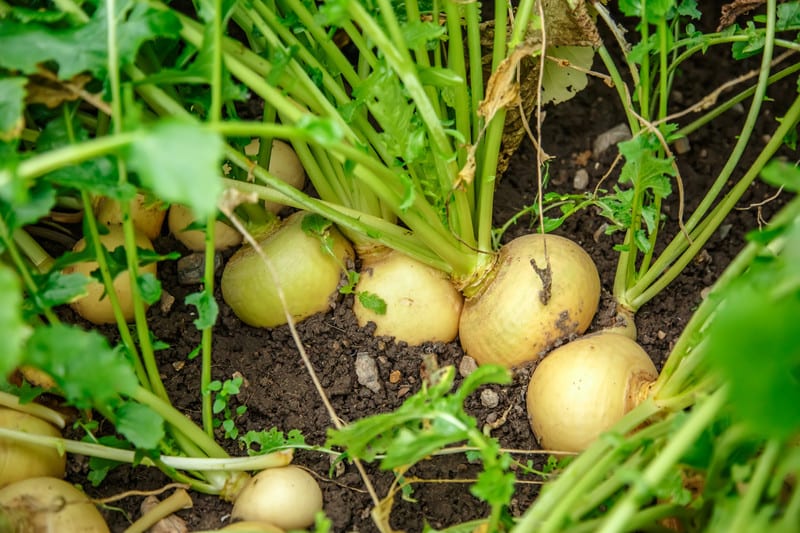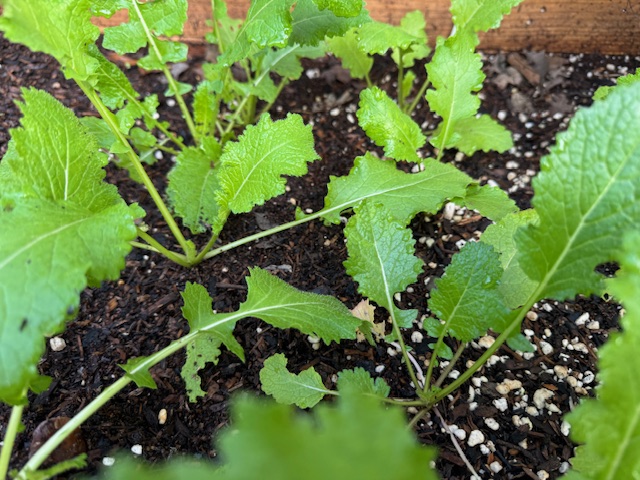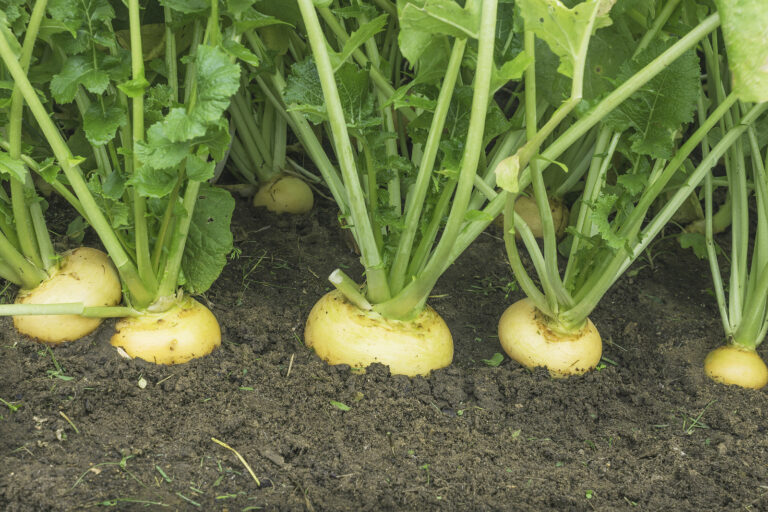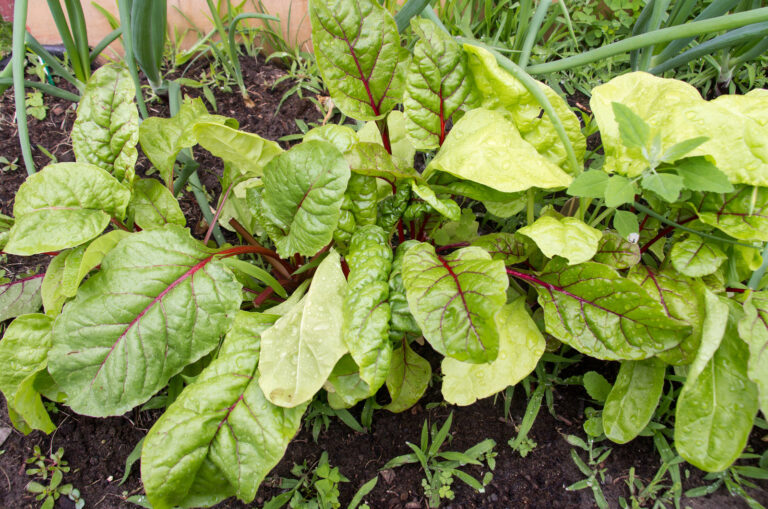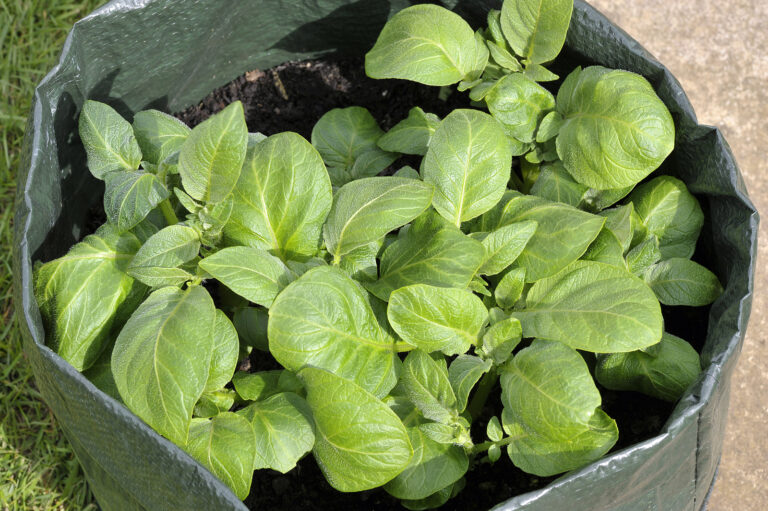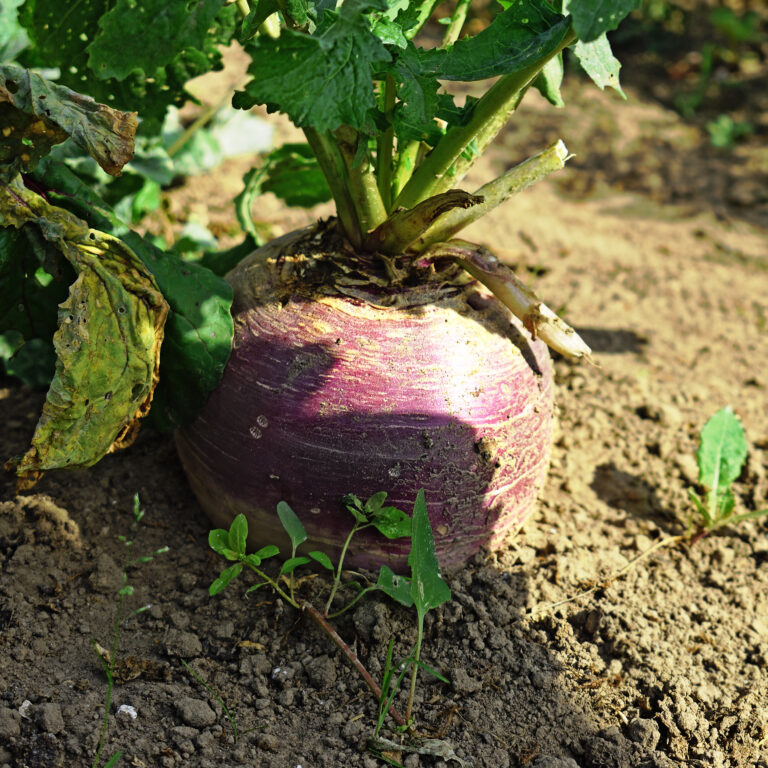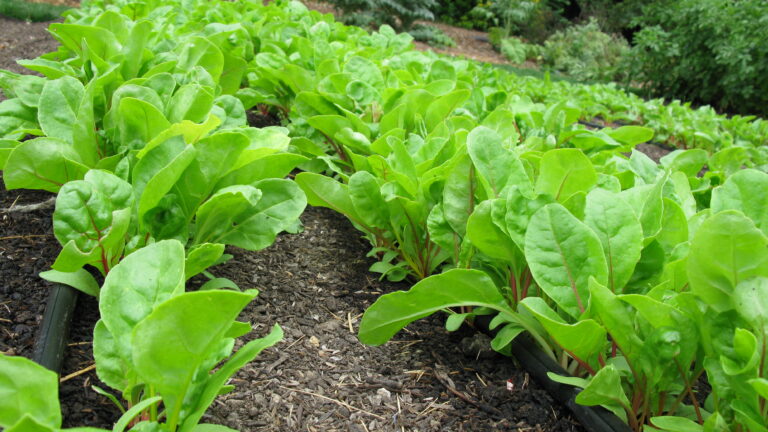Turnips Seed Starting Tips
Turnips are grown in warm-winter regions in spring, fall, and winter. They are grown in cold-winter regions in spring and autumn.
Plant turnips in spring as soon as the soil is workable.
Good turnip quality depends on quick growth. Plant turnips in humus-rich, well-drained soil. The soil need not be prepared deeply, but the surface should be fine and smooth. Apply lime to strongly acidic soils if a soil test shows the need.
Cover the seeds lightly; when broadcasting, rake the seeds in lightly with a garden rake.
Tools for Vegetable Gardeners at Amazon:
- All-Steel Nursery Spade with D-Grip Handle
- 4-Tine Spading Digging Fork with D-Handle
- Digital Soil pH Meter Outdoors Greenhouse
There are both white-fleshed and yellow-fleshed varieties of turnips. Purple Top White Globe is the most popular, white-fleshed variety. Golden Ball is the most popular, yellow-fleshed variety. For turnips greens, grow Seven Top.
Turnips reach harvestable size in 60 to 80 days. They are hardy to cold but susceptible to heat.
More tips:
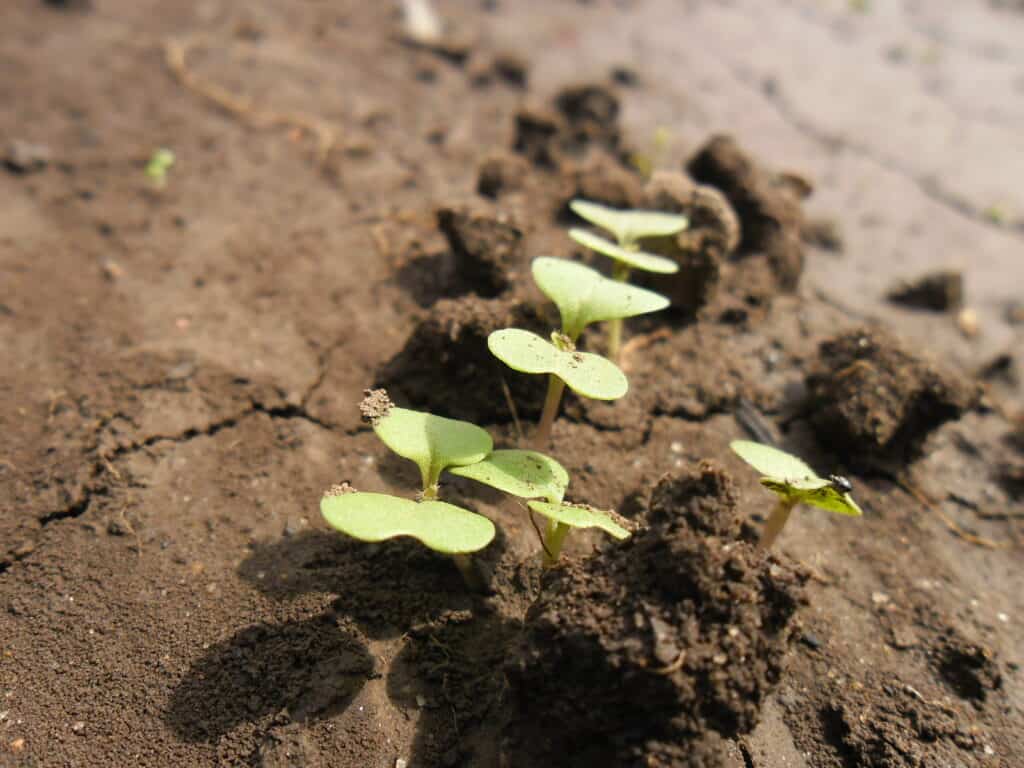
Turnip planting details
- Sowing depth: ¼ inch (.6 cm)
- Space between plant after thinning: 3-4 inches (7-12cm)
- Days to sprout: 9
- Days to harvest: 45-55
- Storage period: 6-8 weeks
- Seeds per 100-row feet: ½ ounce (14g)
- Yield per 100-row feet: 100 pounds (45 kilos)
- Suggested Varieties: Purple Top White Globe (white flesh), Golden Ball (yellow flesh); Seven Top (turnip greens)
- Notes: Best when harvested and used young.
Turnip sowing and planting tips
- Start turnips from seed sown directly in the garden.
- Seed is viable for 4 years.
- Start seeds in the garden about 5 to 4 weeks before you expect the last frost. Turnips can be started indoors, but they—like most root crops—are difficult to transplant to the garden with success.
- If started indoors and transplanted, allow two additional weeks to maturity as a result of root insult at transplanting; nip off the long thread tip of the beetroot when transplanting.
- Sow seed ½ (12 mm) inch deep and be sure to heel or stamp the soil firmly in; turnips often fail to germinate when there is insufficient contact with the soil.
- Sow seed 2 inches apart and later thin to 4 to 6 inches (10-15 cm) apart for large storage turnips, and 2 to 4 inches apart for greens.
- Space rows 12 inches apart.
- To improve germination sow seed at dusk or on a cool, cloudy day.
- Sow seed in loose, fertile soil. Adding aged compost to planting beds in advance of sowing will feed the soil and aid moisture retention.
- The seeds should germinate in 3 to 10 days at an optimal temperature of 70°F (21C) or thereabouts; germination will take longer in colder soil.
- The optimal soil temperature to grow turnips is 60°F (16°C).
- Make additional sowing at 3-week intervals for a continuous harvest, but time sowing so that the crop does not mature in hot weather.
- Turnips prefer a pH range of 5.5 to 6.8.
- Grow turnips in full sun for best yield; turnips tolerate partial shade.
- Avoid planting turnips where potatoes have grown recently.
- Fertilize with an organic fertilizer such as fish emulsion at half strength.
- Common pest enemies are aphids, flea beetles, and cabbage root maggots. Protect the seedlings from pests and cold for two to three weeks after planting with spun poly-row covers.
Interplanting: Plant turnips with bush beans, peas, southern peas, tomatoes, peppers, cucumbers, and squash.
Container Growing Turnips: Choose a container 10-12 inches (25-30 cm) deep.
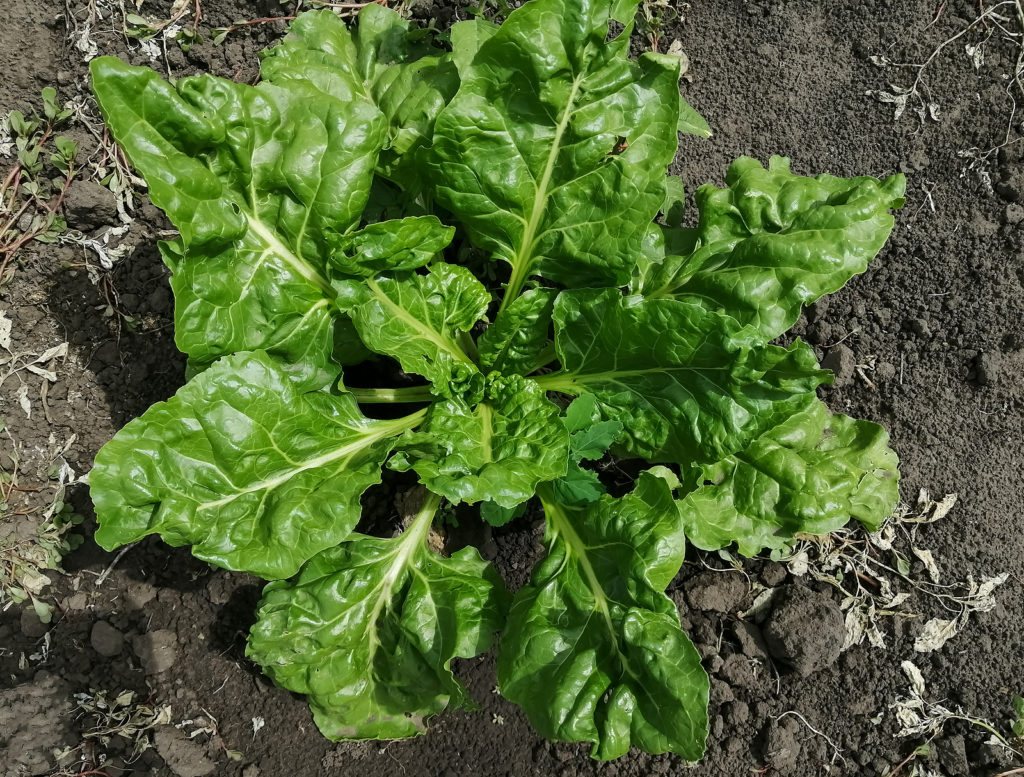
When to plant turnips
Sow turnips in spring for an early summer harvest and use; direct sow in the garden 5 to 4 weeks before the last frost in spring. Start a second crop in late summer for winter storage and use.
Grow turnips and other root crops in light-textured soil free of pebbles and stones. This will ensure roots do not split or become malformed.
Turnips mature in 30 to 50 days depending on the variety.
Turnip planting calendar
Planting for late spring and summer harvest
- 6-8 weeks before the last frost in spring: direct-sow in a plastic tunnel or cold frame.6-4 weeks before the last frost in spring: direct sow in the garden; minimum soil temperature is 40°F.
Planting for fall and winter harvest:
- 6-8 weeks before the first frost in fall: direct-sow in the garden.
- 4-6 weeks before the first frost in fall: direct sow in a plastic tunnel or cold frame.
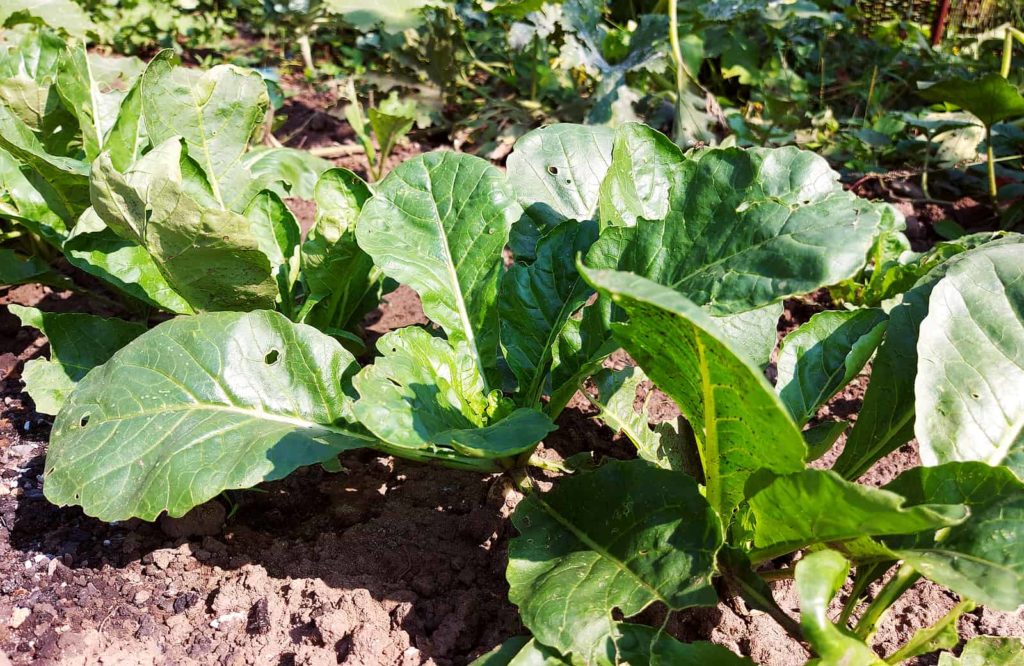
Planting dates for spring and summer harvest
(These dates are for the Northern Hemisphere)
| Average date of the last frost | Planting dates |
| Jan. 30 | Jan. 1-Mar. 1 |
| Feb. 8 | Jan. 1-Mar. 1 |
| Feb. 18 | Jan. 10-Mar. 1 |
| Feb. 28 | Jan. 20-Mar. 1 |
| Mar. 10 | Feb. 1-Mar. 1 |
| Mar. 20 | Feb. 10-Mar. 10 |
| Mar. 30 | Feb. 20-Mar. 20 |
| Apr. 10 | Mar. 1-Apr. 1 |
| Apr. 20 | Mar. 10-Apr. 1 |
| Apr. 30 | Mar. 20-May 1 |
| May 10 | Apr. 1-June 1 |
| May 20 | Apr. 15-June 1 |
| May 30 | May 1-June 15 |
| June 10 | May 15-June 15 |
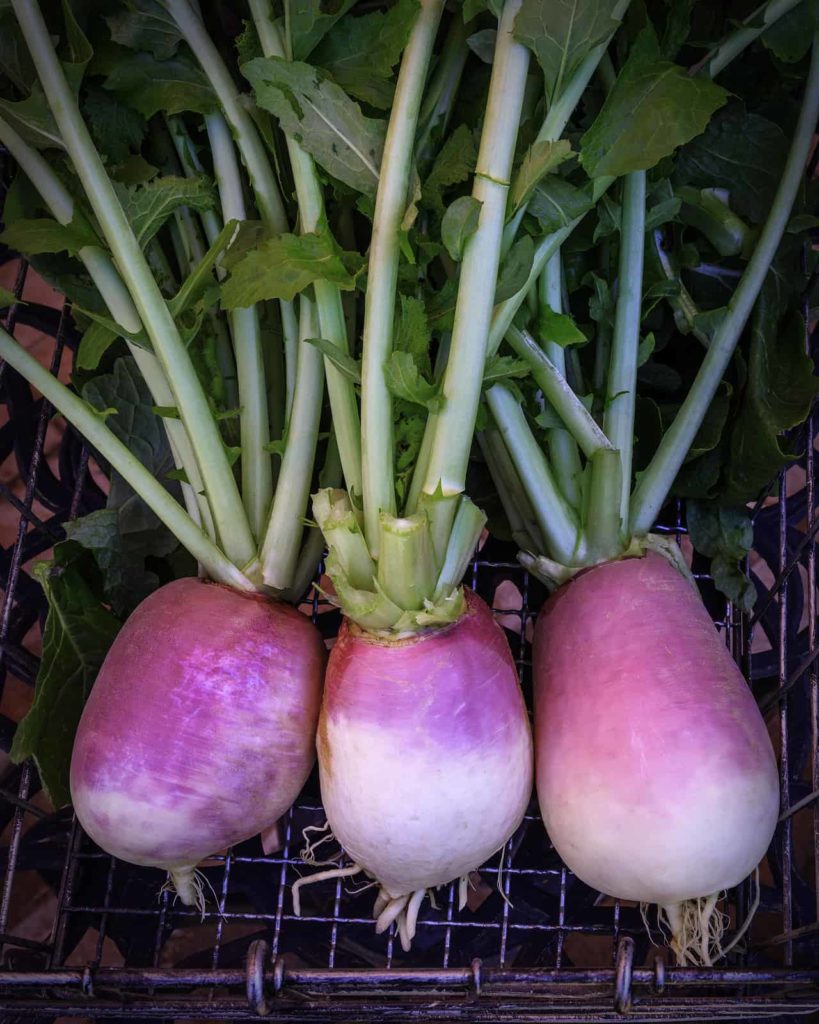
Turnip recommended varieties
- DeMilan’ and ‘Tokyo Cross’ have tender roots and mature early.
- ‘Purple Top White Globe’ is an autumn favorite.
- ‘Aberdeen’ has yellow flesh.
- ‘Hakurel’ is fast maturing with pure white roots.
- ‘Seven Top’, Just Right’, and ‘All Top’ are good choices for greens.
Botanical Name: Brassica rapa var. rapa
Turnips belong to the Brassicacea (Cruciferae) or cabbage family; other members include cabbage, kale, collard, broccoli, Brussels sprouts, and kohlrabi.
Turnip Growing Hub
🥗 Start here: The Ultimate Turnip Growing Guide: From Seed to Harvest
🌱 Planting & Timing
- When to Plant Turnips for Spring, Fall, and Winter Harvests
– Answers “when do I plant turnips?” with zone-based timing. - Turnip Seed Starting Tips
- Succession Planting Turnips for a Continuous Harvest
– Explains timing and spacing strategies to keep the harvest going. - How to Grow Turnips in Containers and Raised Beds
– Great for small-space and urban gardeners. Include container size and spacing details. - How to Space and Thin Turnips for Full Roots
– Many gardeners fail to thin properly. This solves a common issue.
🌿 Care & Maintenance
- How Much Water Do Turnips Need? A Watering Guide
– Helps answer “why are my turnips woody or bitter?” - How to Fertilize Turnips for Tender Roots and Tasty Greens
– A common struggle: too much leaf growth, small roots. - Best Companion Plants for Turnips (And What to Avoid)
– Evergreen content with strong search and Pinterest appeal. - How to Grow Turnips in Hot Weather or Warm Climates
– Address bolting, bitterness, and timing challenges in Zones 8–10.
🐛 Pests, Diseases & Troubleshooting
–Flea beetles, aphids, damping off, white rust Includes IPM methods
- Why Are My Turnips All Tops and No Roots? What Went Wrong
– Diagnostic article that answers a frequently asked gardener problem. - How to Prevent Woody Turnips and Improve Texture and Flavor
– Addresses late harvest, heat, and drought issues.
🧺 Harvest, Storage & Kitchen Use
- How and When to Harvest Turnips for Best Texture
– Cover baby turnips, mature roots, and leafy greens. - How to Harvest and Store Turnips
– Answers “how long do turnips last?” and “can you store turnips in sand?” - Freezing and Preserving Turnips: A Beginner’s Guide
– Popular in late fall/early winter, great for preserving guides. - Eight Ways to Cook and Serve Turnips: Roots, Greens, and Recipe Ideas
– Kitchen-friendly post that links to growing and harvesting. - How to Use Turnip Greens in the Kitchen
– Zero-waste kitchen content that connects gardeners and cooks.
🌾 Varieties & Seed Saving
- Best Turnip Varieties for Flavor, Size, and Growing Time
– Compare fast-maturing, heirloom, and dual-purpose types. - Turnip Varieties for Mild Climates and Short Seasons
– Useful for Zones 8–10 and gardeners with short falls.
Turnip articles on Harvest to Table:
How to Harvest and Store Turnips
Eight Ways to Cook and Serve Turnips
Three Ways to Cook Turnip Greens
Turnip, Rutabaga, and Kohlrabi Growing Problems Troubleshooting
Garden Planning Books at Amazon:

